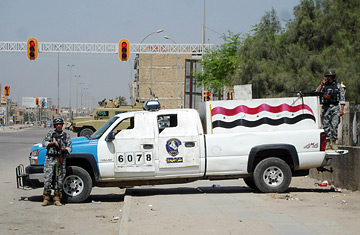
Iraqi police in the southern city of Basra.
The massive operation by the Iraqi army in Basra could be a defining battle against Shi'ite militias. Reports from the southern city — the hub of Iraq's oil industry and gateway to its main ports — say fierce fighting has broken out between government forces and militias. Eyewitnesses have told TIME of several smoke plumes rising out of the city's northern districts, and the sound of explosions and gunfire. Iraqi TV channels have shown images of helicopters flying over the city, and troops sweeping through some streets. At least 22 people were killed, and 58 wounded, in the fighting.
Prime Minister Nouri al-Maliki arrived in Basra on Monday, accompanied by his ministers for defense and the interior, to personally supervise the operation. For Maliki, this is a crucial show of force. For much of the past three years, the Iraqi government has had little influence over Basra. As British troops have steadily withdrawn from the city, it has fallen into the control of three major Shi'ite militias — Moqtada al'Sadr's Mahdi Army, the Iran-backed Badr Brigades and a local group associated with the Fadila Party. The three have recently fought turf battles over large swaths of the city, claiming hundreds of lives.
Although there are over 4,000 British troops at a base outside Basra, they have done little to curb the violence. "We have a capacity to provide air and other specialist support if needed, but at this time British involvement is minimal," a British Ministry of Defense spokesman said, declining to be identified in accordance with department policy. Many Iraqis blame Basra's descent into chaos on flawed British strategy. They contend that in their haste to draw down forces, the British did little to train and bolster the local police force. Instead, many militia fighters were recruited into the police, making the force a part of Basra's problems rather than a solution.
Maliki's government has repeatedly sworn to bring the militias to heel, but this is the first major offensive it has mounted in Basra. Early reports suggest the military drive is targeting the Mahdi Army, which controls much of northern Basra. But Iraqi officials have said Tuesday the operation will continue until all militias have surrendered.
Maliki's government and the Iraqi Army desperately need a big military success. Most of the credit for the reduction in violence across Iraq over the past year has gone to the U.S. military's "surge" strategy, and to the Sunni tribes that switched sides to fight al-Qaeda. The Iraqi security forces have appeared, at best, mere spectators; at worst, they are seen as sectarian militias in uniform. A spectacular win in Basra would help give the army and police some much-needed credibility among ordinary Iraqis.
Failure to impose Baghdad's writ on Basra would have major economic repercussions — already, the oil pipelines are frequently bombed and large quantities of crude smuggled out. But there's more at stake: While he directs the fighting in Basra, Maliki must also prepare himself for a political backlash in Baghdad. Two of the militias have close ties to the government: Sadr controls a large block of the members of parliament, and the Badr Brigades are the military arm of the Supreme Islamic Iraqi Council, the largest Shi'ite party. If both political blocks withdraw their support for Maliki, that would doom his government.
The Iraqi capital, meanwhile, is bracing for a fallout from the fighting in Basra. Large parts of western Baghdad have been shut down by a strike called by Sadrists. Anticipating violence from the Mahdi Army, the Iraqi Army has increased patrolling in the city and reinforced police checkpoints.
